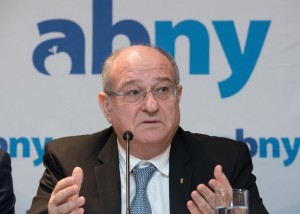Future of Higher Education in NYC
Technion President Peretz Lavie Joins ABNY’s “Future of Higher Education in NYC” Panel Alongside Leaders from Columbia University, New York University, Cornell Tech, and the City University of New York
New York, NY (January 27, 2017): Professor Peretz Lavie, president of the Technion-Israel Institute of Technology, joined a panel of other leaders from New York’s top universities on Thursday to discuss the role of the applied sciences and higher education in driving economic growth for New York City. Hosted by the Association for a Better New York (ABNY), the panel included Lee C. Bollinger, president, Columbia University; Andrew Hamilton, president, New York University; Dan Huttenlocher, dean and vice provost, Cornell Tech; and James B. Milliken, chancellor, The City University of New York. Rachel Haot, managing director of 1776, served as moderator.
The event marked the first time the Technion’s Lavie and Cornell Tech’s Huttenlocher joined in such an extensive dialogue with their peers in NYC’s higher education community, since the Technion and Cornell University together won the City’s 2011 competition to create a new Applied Sciences graduate school on Roosevelt Island. Much of the discussion focused on innovations in higher education and how Cornell Tech and the Jacobs Technion-Cornell Institute will impact New York City’s economy. The Institute is forecast to drive $23 billion in long-term economic development, and President Lavie described how the Technion’s presence will help strengthen the crucial link between the City’s education and business communities.
Lavie recalled assembling a group of peers upon receiving Mayor Bloomberg’s letter inviting the Technion to participate in the Applied Sciences NYC Competition.
“I told them – you have the opportunity to create something from scratch in a very unique way. We should start looking at the industry and businesses of the City and build a university that will engage students in these industries and businesses,” Lavie said. “This is how we started to think about what we could bring to New York. And I would say that so far, it is a success story. The Jacobs Institute and Cornell Tech have attracted fantastic faculty members and absolutely great students. I feel this is one of the greatest experiments in academic education in modern times.”
Through this unprecedented Israel-US alliance, the Technion is bringing its game-changing brand of science and technology education to New York. Lavie hopes the Technion’s success in attracting diversity in academic education will also be reflected in its campus in the United States.
“I don’t know if many of you know, but at the Technion, 21% of students are minorities. Of these, 61% of them are women studying science and engineering,” Lavie explained. “I don’t know of any university anywhere with a higher percentage of women in science and engineering. We believe that diversity is a key for academic excellence.”




